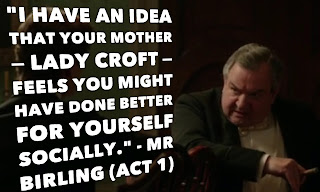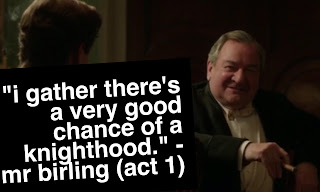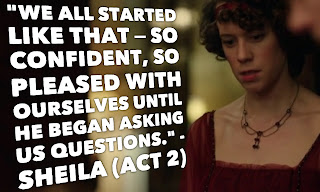 An Inspector Calls
An Inspector Calls
- Susceptible = Sheila and Eric are more susceptible to the Inspector's beliefs
- Self awareness = Sheila is presented as having self-awareness when she admits her wrongdoing and acknowledges her role in events
- Sycophantic = Gerald is shown as sycophantic towards Mr Birling as he agrees with all his Capitalist sensibilities
- Predatory = Gerald is predatory towards Eva as he takes advantage of her lower social status
- Malleable = The younger generation are more malleable than the older generation (able to change)
- Invariant = Mr and Mrs Birling are shown as invariant in their opinions (non-changing)
- Corrupt = The morals of the upper classes are shown as corrupt since they do not act as they should
- Immorality= Mr and Mrs Birling do not admit their own immorality (lack of morals)
- Disreputable = Eric is exposed as a disreputable character
- Pivotal = changing point = The realisation that the Inspector is not a real Inspector is a pivotal point in the play
- Critique = An Inspector Calls is Priestley's social critique of the upper classes and the Capitalist viewpoint
- Hypocrisy = The Birlings show hypocrisy because they judge others for their morals whilst hiding secrets of their own
- Absolves = Eva Smith is the most moral of the characters as she absolves Gerald and Eric of responsibility when they act badly towards her
- Abdicates responsibility = Mr Birling continually abdicates all responsibility and takes no blame
- Infidelity = Gerald's infidelity with Eva Smith shows that he is not a true 'Gentleman' as far as Edwardian principles are concerned
- Recriminations = The many recriminations against the family are brought by the Inspector
- Accusatory = The Inspector's tone is consistently accusatory towards the family
- Contemptible = Priestley portrays Mrs Birling's behaviour as particularly contemptible for the reader as she acts cruelly out of spite
- Prejudiced = The Birlings talk about 'girls like this' showing that the upper and middle classes were prejudiced towards the lower classes
- Haughty = Mrs Birling talks in a haughty manner to the Inspector because she believes her social superiority is important
- Snobbery = Mrs Birling shows snobbery when she judges girls of a lower class
- Apathy= lack of interest or concern
- Social injustice= Priestley's message is that we should stop social injustice and take responsibility for fellow mankind
Poetry
- Incongruous - means out of place (Storm / Bayonet Charge)
- Irregularity - not regular (Storm)
- Traumatised - mentally affected by an event (Remains / Exposure)
- Apathy - lack of care / emotion towards something (Remains / MLDuchess / Exposure)
- Guilty conscience - feeling bad (Remains)
- Social conscience - feeling responsible about society's problems (London)
- Transient - man's reputation is transient but nature's power lasts (Ozymandias / Prelude)
- Life-affirming experience - Prelude
- Redemption - Remains / War Photographer
- Isolation - Prelude / Checking out
- Imagination- Prelude
- Patriotism - Charge of the Light Brigade
- Identity Crisis - Checking Out / Kamikaze / Emigree
- Dissension- Checking Out
- Rebellion - Checking Out
- Grieving - Poppies
- Maternal - Poppies
- Representative eg The hare in Bayonet Charge can be seen as representative of the soldiers
- Reflective - Prelude / London
- Corruption and Tyranny and Social Injustice - My Last Duchess / London
Poetic Terms
- Alliteration– Words beginning with same letter sounds to create a notably emphasis on words “dark dreary dreams”
- Assonance– Like alliteration, the sounds of assonance come from within the word rather than the start “Fearful tears of misery” (emphasis on the e-a-s sounds)
- Consonance– Consonant sounds at the end of words “wet set of regrets”
- Cacophony– Harsh sounds in order to make a discordant sound. “dark knuckles wrapping across bricks” (often Ks, Ts, Cks).
- Onomatopoeia– Words which sound like the effect they describe “splash, slap, crack”
- Repetition– Repeating words over a verse, stanza or poem to draw focus and add emphasis.
- Rhyme– Words with similar ending sounds creating a music like effect or flow “theme/stream/dream” Rhythm– Organisation of words to create a noticeable sound or pace, not necessarily musical but with a clear ‘beat’. Can include the structure of the work and is often measured in syllables.
- Allegory– Something symbolic, an allegory can often be a story that represents larger things, like the tortoise and the hare.
- Allusion- Referring to something well known, nowadays that could be a celebrity but it could be anything that fits the context of the poem (Shakespeare will make very old allusions we may not understand).
- Ambiguity/Ambiguous– A word or idea meaning more than one thing to provoke thought.
- Analogy– Compare something unfamiliar with something familiar to help people understand.
- Cliché– Something which is used a great amount and becomes expected or even cheesy, “raining cats and dogs”.
- Connotation/Connote– The associations with a word e.g. Rose—Love and Passion. Contrast– Closely placed ideas which are opposites or very different. ‘He had cold eyes but a warm heart’ Denotation/Denote– The literal definition fo something without reading too deeply into it. Euphemism– Where something distasteful is said in a more acceptable way ‘she is at peace’- she is dead
- Hyperbole– An over the top exaggeration for effect.
- Irony– Deliberate use of a false or misleading statement in such a way that the truth is apparent. “Wow dead flowers, what I always wanted…”
- Metaphor– Direct comparison of two things. States one thing is or acts as another without using words ‘like’ or ‘as’
- Oxymoron– two words placed together with differing meanings to create a new meaning ‘bitter sweet’
- Paradox– A situation or statement which contradicts itself. ‘the taller I get the shorter I become’. Personification– Describing an inanimate object or animal with human qualities.
- Pun– using words with multiple meanings while intending both, often used for comic effect.
- Simile– Comparing two or more objects with words ‘like’ or ‘as’
- Verse– A line of a poem, needn't be a complete sentence.
- Stanza- A collection of verses similar to a paragraph, separated from other stanzas.
- Rhetorical Question– A Question intended to provoke thought without expecting an answer.
- Rhyme Scheme– Regular or irregular (does it follow a pattern or not) popular examples are alternate rhymes abab, cross rhyme abba, or couplets aabb. Rhyme scheme often depicted by letters abcd to help follow.
- Enjambment– A sentence or on-going piece of text carried over verses or stanzas to continue the spoken effect without pause.
- Form– Open (no real pattern of rhyme or length), closed (follows a specific form or pattern), couplets (pairs of rhyming lines), quatrains (stanzas of 4 lines, often rhyming), blank verse (iambic pentameter with not consistent rhyme).
- Fixed Forms– Some examples include Sonnets (3 quatrains and a couplet), Ballads (large poems in quatrains often telling a story)
- Pathetic Fallacy– Using weather or environment to reflect the themes and contexts of the poem, e.g. a horror genre may involve a dark and stormy night, joyful poems may use a sunny meadow etc. Foreshadowing– Content in the poem which gives an indication of the direction the poem will take, allows people to guess what will happen or the poet to prepare the reader.
- Sensory Imagery– where the language is used to evoke the senses (sight, smell, touch, taste, sound), can often include tactile (touch based) or musical (sound based) language.
- Synaesthesia– The overlapping and blending of senses ’he had a soft smile’ or ’she had a fiery voice’ Tone/Mood– The way a poem or speaker is intended to sound, often suggested by the topic, content and structure. This can be very subjective and is often determined by looking at the poem in its entirety




















































